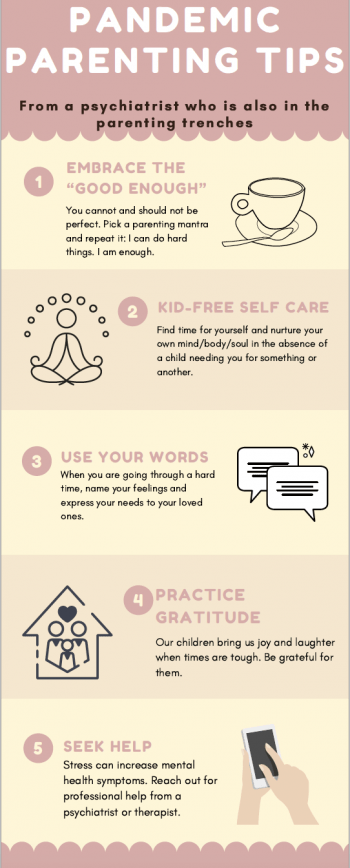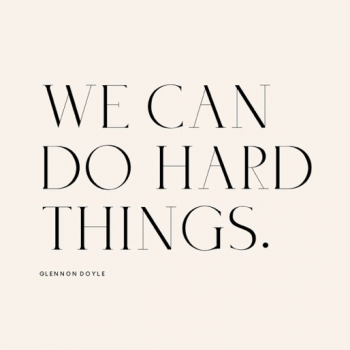By Naazia Azhar, MD
Parenting was hard enough in 2019, am I right?

It started with talk of cloth diapers vs. disposable, sleep training debates, early childhood education. Then it got bigger: which activities to enroll them in, driving them around to said activities, finding the best school for your child, sibling rivalry, the right level of discipline.
But when March 2020 rolled around, the struggling parents of the world united to find that this was hard in a whole new way. In the initial months of lockdown, I worried less about the school year (it’s March, that rounds up to June anyway) and more about just surviving. As a physician who hails from and studied in New York, I knew people working frontline in those city hospitals overflowing with dead bodies. I knew people
who died. As a parent, you are responsible for another small human’s entire existence. My earliest thoughts were that COVID19 was coming to infect me and/or my husband, and who was going to take care of our perfect and wonderful three children. Wills were drawn hastily. All the feelings were felt, but they were communicated after bedtime when it was safe for the anxiety to hit the surface. Shudder. I really don’t want to go back to that March-April feeling.
Then, I struggled to work from home, locked myself into one room in the house to take a call when the baby was crying in another. I couldn’t reorganize my closets because, enter toddler. But some interesting things were happening. Trying new recipes like that Dalgona coffee or baking bread from scratch. Watching Frozen 2, which spoke to so many of my pandemic thoughts (This will all make sense when I am older… Into the unknown…) and every Star Wars movie. That Disney sing-along where all the performers sang from their own homes! Going on family walks, actually spending time in our backyard, listening to the birds. Appreciation. Gratitude.
As a psychiatrist, I know that childhood experiences matter. Adverse childhood experiences are risk factors for nearly every psychiatric diagnosis out there- depression, substance use disorders, PTSD, and the list goes on. We would all like our children to come out of this whole thing safe and well. Back in March, there were a lot of good tips offered on how to get through the lockdown. But now it’s August, and schools are trying to figure if and how to reopen. It’s August, and the pandemic is not ending, not even close. This is a marathon and we better keep breathing and keep going. When you’re living on your knees, you RISE up.
How to deal with this marathon? Here are 5 tips from a psychiatrist who is also in the parenting trenches.
- Accept and even embrace the concept of “good enough”
There is a concept developed by pediatrician and analyst Donald Winnicott of being “good enough”: that being perfect would in fact be detrimental and being good enough actually allows a child to figure out frustration. So, school is not going to be perfect. In-person, virtual, some combination of both? Good enough. More screen time than you thought you’d ever allow? You have to be good enough, not perfect.
Find a parenting mantra. Hamilton fans can identify with the ballad on parenting, Dear Theodosia “I’ll do whatever it takes. I’ll make a million mistakes. I’ll make the world safe and sound for you.”
Try this one: “I can do hard things. I am enough.”

- Engage in kid-free self-care
Only you know what self-care looks like for you, but I posit that some short period of time of it needs to be kid-free. Obviously, this is much harder to achieve in a COVID world – less available childcare, schools gone virtual – but find some kid-free time, even if it is after bedtime. And you do YOU. For example, thirty minutes of exercise while listening to a favorite podcast or, you know, the Hamilton soundtrack.
- Communicate, or in parent-speak “use your words”
When we get overwhelmed or angry or frustrated, there is a tendency to shut down effective communication. I’m talking about the adults here. Remind yourself to “use your words” when you are having a tough time. Say it out loud, because naming a feeling helps you work through that feeling. The members of your family cannot read minds, so express needs to one other.
- Don’t forget gratitude
Let’s not forget that our children bring joy in hard times. Studies have shown that people who practice gratitude experience less pain, stress, anxiety, insomnia. They have improvements in mental and physical health and have stronger relationships. So, when you’re working on that gratitude journal, don’t forget to add your children somewhere near the top.
- Seek professional help, if needed.
The stress of this pandemic and child care can increase symptoms of mental illness, in people who have had symptoms before or cause new ones to emerge. Look out for changes in mood, behavior (e.g. are you not wanting to do things you used to like to do), sleep, appetite, and ability to concentrate. Ask yourself how long these symptoms have been going on (days is OK, weeks is where it is worse) and if your symptoms are interfering in your day to day life. There are resources for you to use on copingwithcovid.wustl.edu, including groups for skills, support, and mindfulness. You can also make an appointment with the department of psychiatry for you, or your child, by calling: 314-286-1700
And, of course, if you or your child are in crisis, or having thoughts of hurting yourself, please seek emergency treatment at your nearest ER. The National Suicide Prevention Lifeline is 1-800-273-8255. https://suicidepreventionlifeline.org/
Naazia Azhar, MD is an instructor for Washington University Psychiatry.